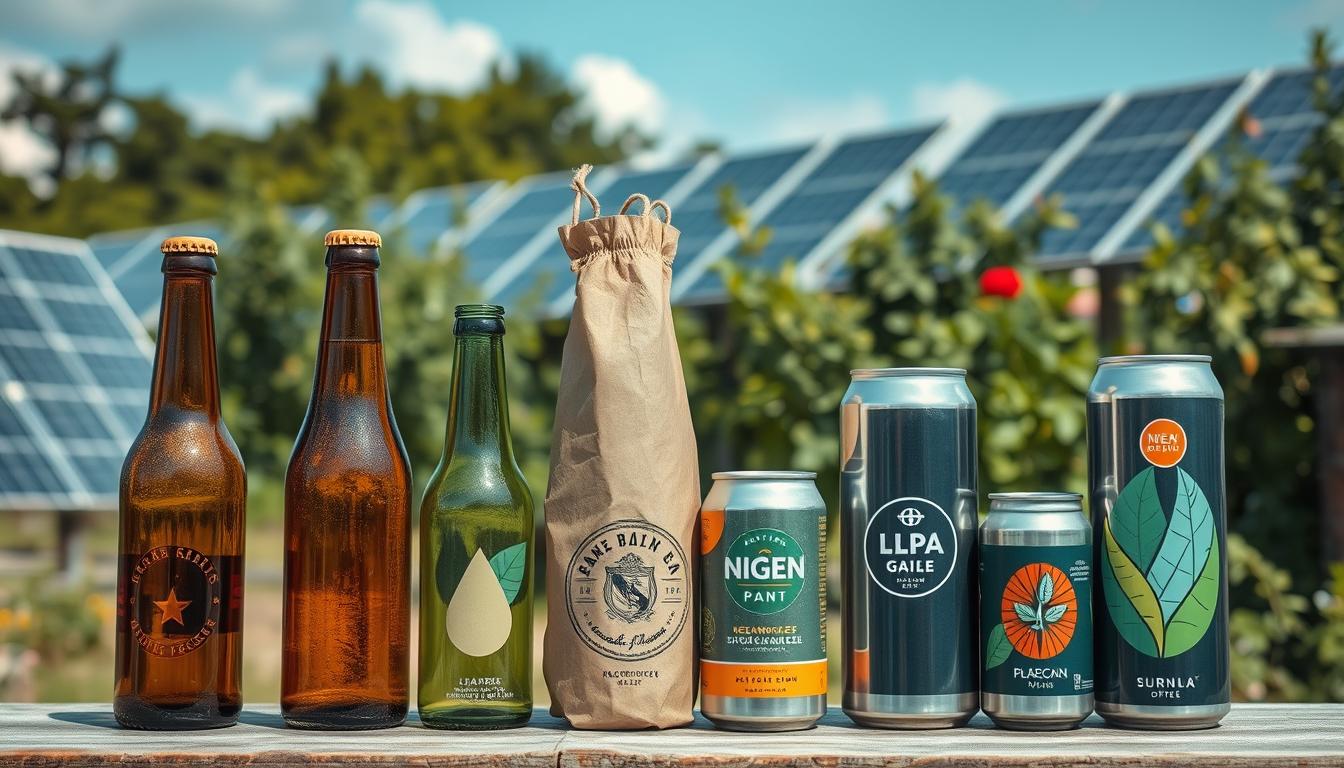A whopping 91% of plastic packaging pollutes the environment or ends up in landfills. This plastic leaks harmful chemicals into our surroundings. The eco-friendly packaging market is booming, set to hit US$ 252.3 Billion by 2026.
As a home brewer, I’m always searching for sustainable packaging options. These choices match my eco-conscious values and help reduce environmental impact.
Biodegradable materials offer a green solution for beer bottles and containers. Plant-based and compostable options are leading the way in brewing’s eco-friendly future.
73% of consumers are ready to pay more for sustainable packaging. This number jumps to 83% among younger buyers. Clearly, the demand for biodegradable beer packaging is growing fast.
Introduction to Eco-Friendly Beer Packaging
Breweries are adopting sustainable beer bottle alternatives to reduce environmental impact. A 2018 study found consumers willing to pay more for eco-friendly options. This trend reflects a growing awareness of packaging’s environmental effects.
The market for eco-friendly drink packaging is booming. It was worth $167.8 billion in 2020. Projections show it reaching $252.3 billion by 2026. This growth stems from demand for sustainable solutions.
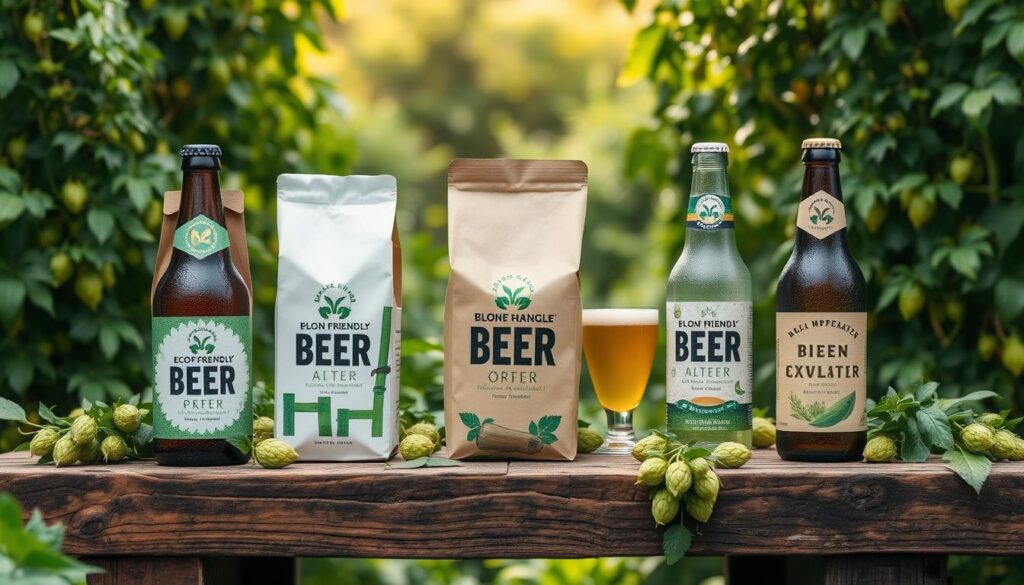
Sustainable packaging minimizes waste and reduces carbon footprints. It encourages recycling and promotes a plastic-free environment. These benefits drive innovation in the industry.
Refurbishing the drink’s packaging can encourage the shrinkage of carbon footprint, increase the recycling of products, and establish a plastic-free environment.
Eco-friendly beer bottle alternatives are on the rise. Here are some notable innovations:
- Paboco’s paper bottles, which offer a 65% reduction in plastic content compared to standard plastic bottles
- Pulpex pulp bottles, which have a 90% lower carbon footprint than glass and 30% lower than PET bottles
- Packamama’s wine bottle, made from recycled PET, which is 87% lighter than glass
- ByQuest’s Q-Frost technique, offering bottles with pleasing aesthetics in various colors and textures
- E6PR’s Eco Six Pack Ring, a bio-based, biodegradable replacement for plastic rings on beer cans
These sustainable packaging options benefit the environment. They also appeal to eco-conscious consumers. More people now prioritize green beer bottles when making purchases.
The Environmental Impact of Traditional Beer Packaging
Beer packaging has a big impact on the environment. Many breweries use plastic rings and glass bottles. These materials harm nature and wildlife. Breweries need to find better ways to package their products.

Plastic Six-Pack Rings
Plastic six-pack rings are bad for the environment. They can hurt sea animals and take centuries to break down. These rings add to the growing plastic pollution problem.
Some breweries are using eco-friendly options instead. Biodegradable can carriers made from plants are one solution. These carriers break down naturally, helping the environment.
Glass Bottles and Their Carbon Footprint
Glass bottles keep beer fresh but have drawbacks. Making them uses a lot of energy. Shipping heavy glass bottles also causes more pollution.
| Packaging Material | Environmental Impact | Sustainable Alternatives |
|---|---|---|
| Plastic Six-Pack Rings | Harm marine life, take centuries to decompose | Biodegradable can carriers, paper-based packaging |
| Glass Bottles | High carbon footprint in production and transportation | Lightweight glass, recycled glass, refillable bottles |
Some breweries are trying new options. They use lighter glass, recycled glass, or refillable bottles. These choices reduce pollution from making and moving beer bottles.
“We must rethink the way we package our products and strive for zero-waste solutions. It’s not only the right thing to do for the environment but also for the long-term sustainability of our industry.”
Beer makers need to use better packaging. They should pick materials that don’t harm nature. New packaging ideas can help create a cleaner world.
Biodegradable Packaging Materials
Eco-conscious consumers are driving demand for sustainable beer packaging. Biodegradable options offer a solution to reduce waste in the brewing industry. These materials decompose naturally, leaving no toxic residues behind.
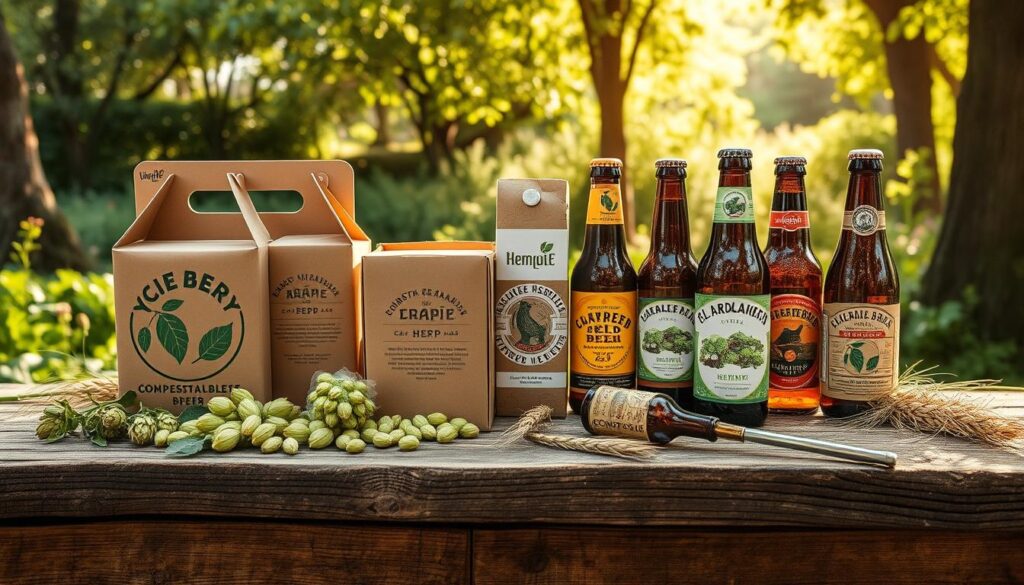
Plant-Based Packaging
Plant-based materials are a breakthrough in zero-waste beer packaging. These containers use renewable resources like cornstarch, sugarcane, or bamboo. They’re biodegradable and require less energy to produce than traditional materials.
Here are some examples of plant-based beer packaging:
- Carlsberg’s Green Fibre Bottle, made from sustainably sourced wood fiber
- Saltwater Brewery’s edible six-pack rings, crafted from barley and wheat remnants
- Eco-friendly beer carriers made from molded pulp or recycled paper
Compostable Packaging
Compostable packaging helps breweries reduce their environmental impact. These materials break down completely in composting environments. They can be made from plant fibers, bioplastics, or even mushroom mycelium.
According to a 2020 McKinsey consumer survey, 60 percent of respondents indicated they would pay more for a product with sustainable packaging, such as those that are plastic-free and/or biodegradable in the beer industry.
E6PR leads in compostable beer packaging with innovative six-pack rings. Their can-holders are made from compostable agricultural byproducts. When disposed properly, they break down into fertilizer for new crops.
| Packaging Material | Biodegradability | Renewable Resources |
|---|---|---|
| Plant-Based | High | Yes |
| Compostable | High | Varies |
| Traditional Plastic | Low | No |
Compostable beer packaging requires specific conditions to fully decompose. It must go to a specialized facility or home composting bin. Consumers play a key role in ensuring proper disposal.
The brewing industry continues to explore biodegradable packaging options. Plant-based and compostable materials help breweries reduce their environmental impact. These choices appeal to eco-conscious consumers willing to pay more for sustainable products.
Biodegradable Can Carriers and Rings
The craft beer industry is embracing eco-friendly packaging options. Biodegradable can carriers and rings are reducing single-use plastics. These sustainable solutions help breweries package their products responsibly.
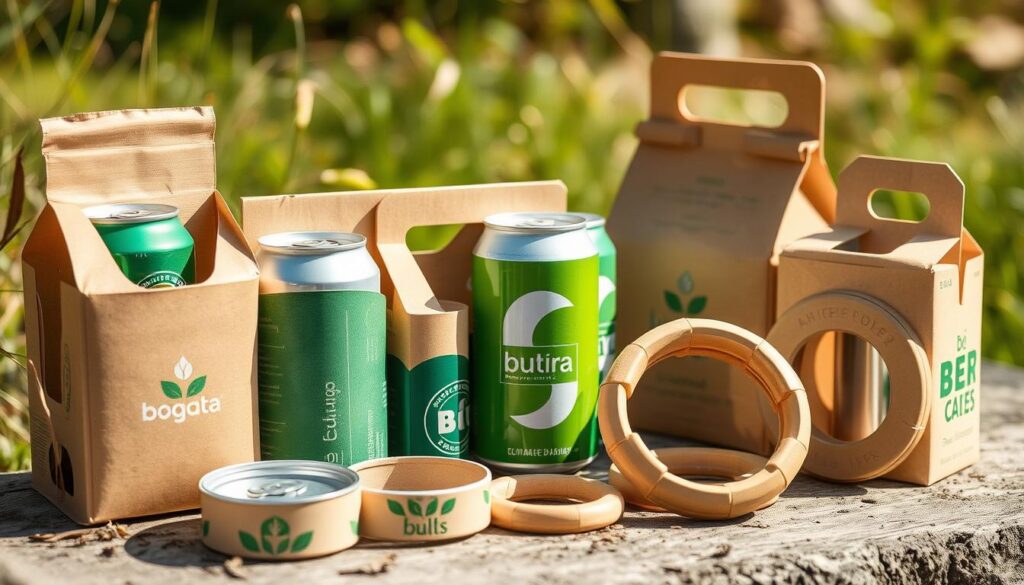
E6PR: Eco-Friendly Six-Pack Rings
E6PR leads in eco-friendly beer packaging with their compostable six-pack rings. Made from agricultural by-products, these Eco Rings are zero-waste. Many breweries worldwide have adopted them since 2017.
Eco Rings are certified compostable and biodegrade naturally. They enrich the environment without harming wildlife. In commercial facilities, they degrade quickly.
Breweries report positive experiences with Eco Rings. The higher cost is accepted as an investment in environmental responsibility. Consumers generally support this eco-friendly choice.
Carlsberg’s Green Fibre Bottle
Carlsberg unveiled the “Green Fibre Bottle” prototype in October 2019. It features sustainably sourced wood fiber exterior and a bio-based PEF film lining. This could be the first 100% plant-based, fully recyclable bottle on the global market.
Major beer companies are investing in eco-friendly packaging alternatives. Carlsberg’s Snap Packs and Corona’s Fit Pack are notable examples. Carlton & United Breweries plan to replace plastic rings with cardboard packaging.
| Packaging Option | Material | Biodegradability |
|---|---|---|
| E6PR Eco Rings | Agricultural by-products | Certified compostable, biodegrades naturally |
| Carlsberg Green Fibre Bottle | Wood fiber exterior, PEF film lining | 100% plant-based, fully recyclable |
| Roberts PolyPro Grip-Pak | Biodegradable LDPE | Certified 100% biodegradable |
Breweries are making significant strides towards reducing their environmental impact. Innovative solutions like Eco Rings and the Green Fibre Bottle are leading the way. The future of sustainable beer packaging looks bright and promising.
Recyclable Packaging Options
Craft beer breweries are exploring sustainable packaging options. Glass bottles have a large carbon footprint. Many breweries now seek recyclable beer containers and eco-friendly alternatives.
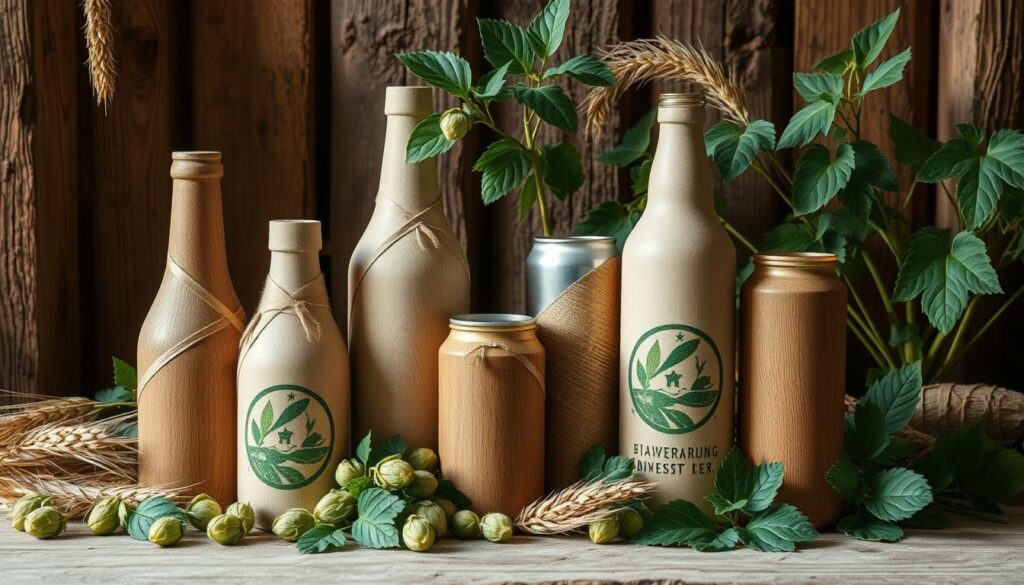
Recycled Plastic Can Holders by PakTech
PakTech, an Oregon company, produces can holders from recycled hard plastic. These holders are made from repurposed milk jugs. The process reduces greenhouse gas emissions by 78%.
PakTech’s manufacturing uses 90% less energy than standard packaging plants. It also eliminates the need for virgin petroleum production. The handles are recyclable, supporting a circular economy.
Aluminum Cans and Their Recycling Potential
Aluminum cans are the most recyclable drinks pack worldwide. They have an average recycling rate of 69%. These cans can be endlessly recycled without losing quality.
Aluminum cans are lightweight and compact. This reduces CO2 emissions during transportation. They also encourage product trials due to their smaller size.
| Packaging Material | Recycling Rate | Energy Savings from Recycling |
|---|---|---|
| Aluminum Cans | 69% | 95% |
| Glass Bottles (UK) | 67.6% | – |
| Plastic Bottles | – | Significantly lower impact on global warming compared to glass |
Recyclable beer containers can greatly reduce environmental impact. Aluminum cans and recycled plastic holders are excellent options. These choices help breweries deliver high-quality products sustainably.
Eco-friendly packaging appeals to environmentally conscious beer enthusiasts. It can help breweries stand out in a competitive market. Investing in sustainable options is a smart move for forward-thinking breweries.
Reusable Beer Bottles and Containers
Craft breweries are embracing reusable beer bottles to reduce environmental impact. These eco-friendly alternatives to single-use packaging foster community and customer loyalty. Refillable bottle programs are gaining popularity among environmentally conscious brewers.
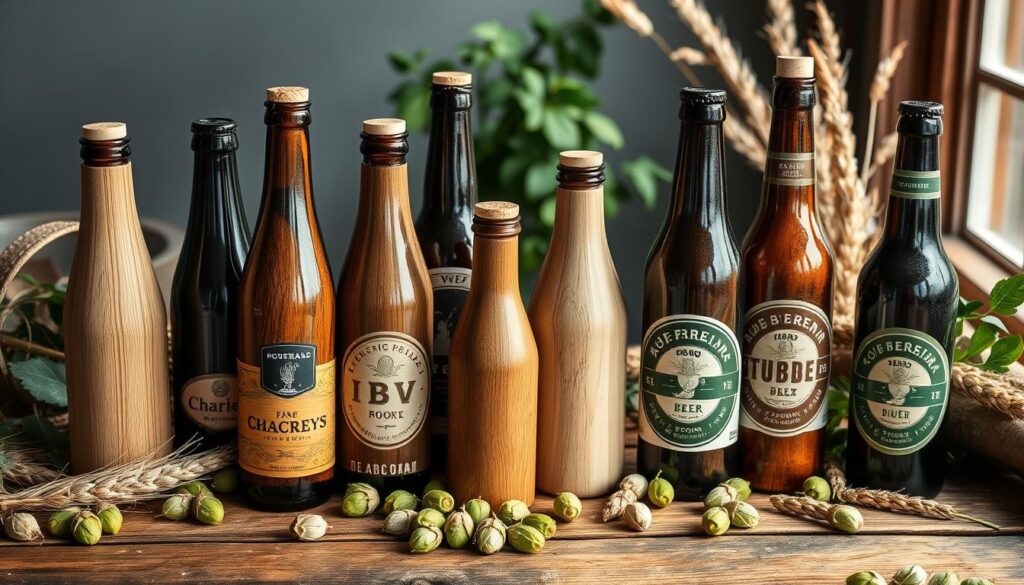
Reusable beer bottles were common in the US during the 1970s. Unique brand packaging led to a decline in refillable containers. Now, consumers are demanding sustainable alternatives due to environmental concerns.
Reusable bottles significantly reduce carbon emissions compared to single-use options. An Oregon study found reusable bottles emit 69 times less carbon than recycled ones. Even reusing a bottle once can cut emissions by nearly half.
| Packaging Type | Carbon Footprint | Reuse Potential |
|---|---|---|
| Single-use glass bottle | High | Low |
| Single-use aluminum can | Moderate | High (recyclable) |
| Reusable glass bottle | Low (with multiple uses) | High (40+ cycles) |
Some consumers may hesitate to use reusable bottles initially. Education about environmental benefits can help overcome these barriers. Customers often become loyal to brands that offer reusable options.
The global market size for returnable glass bottles is expected to grow from USD 5.24 billion in 2022 to USD 9.35 billion by 2032, showing a Compound Annual Growth Rate (CAGR) of 6%.
More breweries are likely to adopt reusable bottle programs as demand grows. The craft beer industry can reduce waste and build loyal customer relationships. Investing in eco-friendly alternatives helps minimize environmental impact.
Breweries Leading the Way in Sustainable Packaging
Many breweries are taking steps to reduce their environmental impact through innovative packaging solutions. These eco-conscious breweries are setting new industry standards. They show how sustainable practices can drive positive change.
Straub Brewery’s Refillable Bottles
Straub Brewery in Pennsylvania offers beer in refillable 16-ounce glass bottles. Customers can return the bottles to the brewery for washing and refilling. This closed-loop system significantly cuts down on material waste.
Bayern Brewing’s EcoLeague Program
Bayern Brewing in Montana introduced their EcoLeague program in 2010. This initiative promotes reusable bottles in the local community. It engages customers in returning and reusing bottles, fostering environmental responsibility.
Allagash Brewing’s Recycling Co-Op
Allagash Brewing in Maine organized a recycling co-op to address remaining waste. This initiative targets the 0.2% of waste not eliminated through other sustainability efforts. By partnering with local businesses, Allagash works towards a zero-waste future.
Upslope Brewing’s Photodegradable Six-Pack Rings
Upslope Brewing in Colorado uses photodegradable six-pack rings made by Hi-Cone. These eco-friendly alternatives use 30% less material than standard rings. They’re designed to avoid harming animals and fit #4 LDPE recycling parameters.
| Brewery | Sustainable Packaging Initiative | Environmental Impact |
|---|---|---|
| Straub Brewery | Refillable 16-ounce glass bottles | Reduces material waste through a closed-loop system |
| Bayern Brewing | EcoLeague reusable bottle program | Engages community in reducing waste through reusable bottles |
| Allagash Brewing | Recycling co-op | Addresses the 0.2% of waste not eliminated through other efforts |
| Upslope Brewing | Photodegradable six-pack rings | Uses 30% less material, avoids animal harm, and is recyclable |
These breweries inspire the industry to adopt sustainable packaging practices. They use reusable bottles, recyclable containers, and eco-friendly alternatives. Their efforts pave the way for a greener future in brewing.
Eco-Friendly Beer Bottle Alternatives
The craft beer industry needs sustainable packaging solutions. Eco-friendly beer bottle alternatives offer a more sustainable approach to packaging. These options reduce waste and minimize the environmental impact of brewing.
PET bottles are a promising alternative to glass bottles. They’re lightweight, durable, and 100% recyclable. PET bottles are 87% lighter than glass, saving energy during transportation.
These bottles are also shatter-resistant. This makes them safer and more convenient for consumers to handle.
Paper Bottles and Their Potential
Paper bottles are an exciting development in eco-friendly beer packaging. These containers are made from recycled paperboard and are fully biodegradable. Frugalpac, a British company, has developed the Frugal Bottle.
The Frugal Bottle is 94% recycled paperboard. It has a food-grade pouch inside that holds up to 750ml of liquid. This bottle can reduce the carbon footprint by 84% compared to glass.
Consumers are more aware of their purchases’ environmental impact. The demand for zero-waste beer packaging is growing. Breweries can reduce their footprint and appeal to eco-conscious drinkers.
Lightweight PET bottles and biodegradable paper bottles offer sustainable options. The future of eco-friendly beer packaging looks promising.

